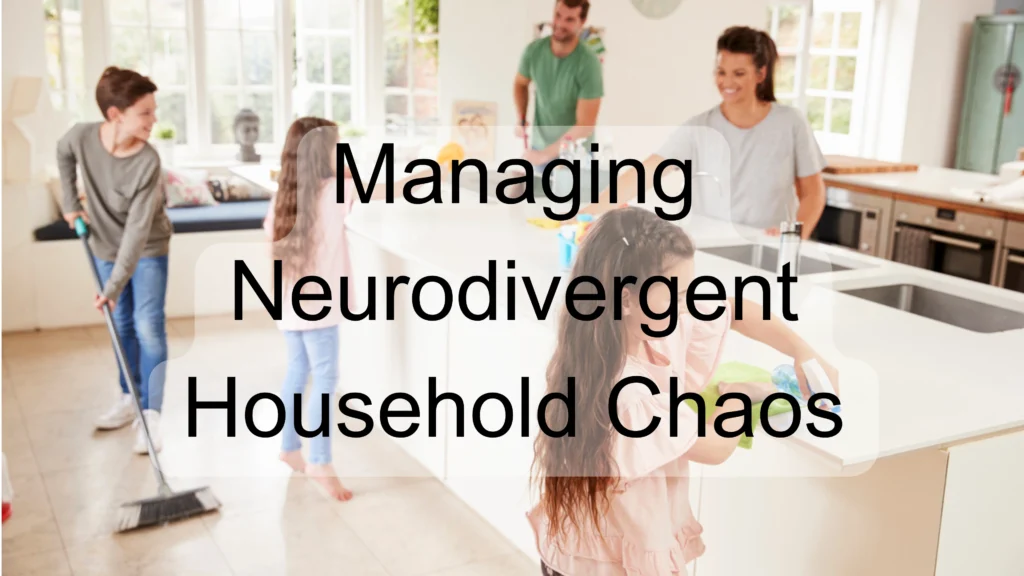MANAGING NEURODIVERGENT HOUSEHOLD CHAOS
Living in a neurodivergent household—whether you’re parenting, partnering, or running a business—can feel like juggling fire while riding a unicycle on a tightrope. If you’re an ADHD entrepreneur, a parent of neurodivergent kids, or both, you already know the soundtrack of daily life can often feel like full-volume chaos.
But here’s the good news: you’re not alone, and more importantly, there are steps you can take—within your reach—that will begin to reduce the noise. With gentle structure, emotional support, and neurodivergent-friendly strategies, it is possible to shift from overwhelm to a sense of grounded connection.
As Gabor Maté reminds us, “The attempt to escape from pain is what creates more pain.” Let’s turn toward the chaos together and create something better.
Step 1: Begin With a Life Audit
Before you make any changes, you need clarity. Many neurodivergent families are simply surviving. Start with a no-blame “Life Audit”:
- List 3 things that feel chaotic daily.
- Identify energy drains: Is it mornings? Mealtimes? Transitioning between work and home?
- Circle ONE that you could improve by 10%.
Micro Action: To lower one friction point, choose a slight shift, such as preparing school bags the night before.
Step 2: Create ADHD-Friendly Time Blocks
Structure doesn’t have to be rigid. The ADHD brain often rebels against too much control. Instead, use energy-based time blocking:
- Morning = High-focus tasks.
- Afternoon = Admin, lighter activities.
- Evening = Connection & calm.
Try the 3-Hour Work Window: three focused hours daily, protected like gold, can move mountains.
Hypnotherapy prompt: “Activating the CEO Brain for Focus & Flow” (see guided audios from our program).
Step 3: Daily Relationship & Family Rituals
Connection keeps chaos from taking over. Could you create a daily ritual to check in with each family member? It can be simple:
- “What’s one thing you need from me today?”
- “Here’s one thing I appreciate about you.”
Try having a 10-minute “Daily Temperature Reading” talk with your partner each morning. It doesn’t need to be perfect; it just needs to be consistent.
Tip: Use a timer to keep these short. Individuals with ADHD tend to perform best with defined boundaries.
Step 4: Emotional Regulation Is a Team Sport
In a neurodivergent household, emotions can run high. ADHD often means emotional flooding, RSD (Rejection Sensitivity Dysphoria), and impulsive reactions.
Teach (and model) the Pause–Process–Respond method:
1. Pause.
2. Name the feeling (“I’m overwhelmed”).
3. Choose a response instead of a reaction.
Try EFT Tapping together—kids love it! (e.g., tapping for “back-to-school” stress or “I forgot my homework” panic).
Step 5: Build External Systems (Not Internal Willpower)
ADHD brains can’t remember the system—they need it to be visible and repeatable:
- Use visual charts for family routines.
- Create a landing zone by the door (keys, backpacks, coats).
- Use shared calendars (Google, Cozi, or printed).
Willpower burns out. Systems sustain you.
Step 6: Don’t Let the Business Eat Your Relationship
Many neurodivergent adults hyperfocus on work because it feels easier than relationships. But relationships need intentional presence.
- Schedule “sacred time” that’s non-negotiable.
- Turn off notifications when you’re with your loved ones.
- Use the guided hypnotherapy: “Disconnecting from Work & Being Fully Present at Home.”
As Dr. Ned Hallowell said, “Connection is the antidote to ADHD.” Prioritise it like your most important meeting.
A Final Word of Encouragement
You are not failing. You are navigating complexity with a brain (or a family of brains!) wired for intensity, curiosity, and creativity. Chaos does not mean you are broken; the system needs adjusting.
Let this be your mantra:
“I don’t need to do everything. I need to do the next right thing.”
If you’d like to take this further, consider exploring programs like Thriving in Business & Love: The ADHD Work-Life Harmony Method, which was created specifically for families like yours. You’re not meant to do this alone.

